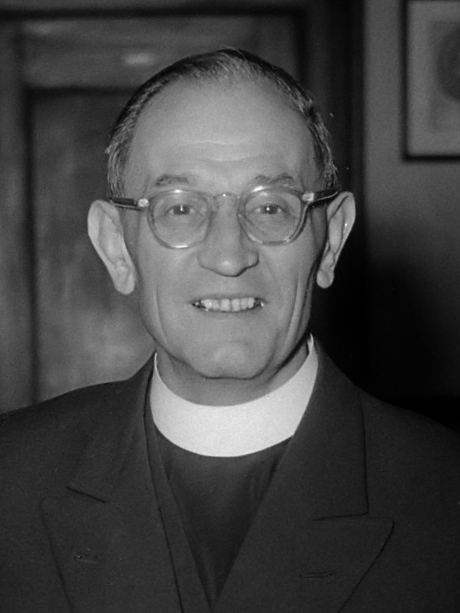
Ds. Martin Niemöller neemt deel aan oecumenische samenkomst in de Grote Kert te Den Haag. Vlnr [Vrnl in spiegelbeeld!] . Ds M.N. W. Smitvoors (van de Haagse Oecumenische Raad), ds. Niemöller en prof. P. Kaetske, predikant van de Duitse Evangelische gemeente in Den Haag
*27 mei 1952
An updated version of Martin Niemöller‘s First they came … for censors:
First they censored pornographers, and I did not speak out—
Because I was not a pornographer.Then they censored terrorists, and I did not speak out—
Because I was not a terrorist.Then they censored “hate speech,” and I did not speak out—
Because I don’t use “hate speech.”Then they censored Nazis, and I did not speak out—
Because I was not a Nazi.Then they censored the KKK, and I did not speak out—
Because I was not a member of the KKK.Then they censored the alt-Right, and I did not speak out—
Because I was not a member of the alt-Right.…
Then they censored the environmentalists, and I did not speak out—
Because I was not an environmentalist.Then they censored the feminists, and I did not speak out—
Because I was not a feminist.Then they censored #BlackLivesMatter, and I did not speak out—
Because I was not Black.…
Then they censored me—and no one was able to speak for me.
Feel free to add to or re-order “Then they censored…” lines based on your own priorities and experience.
For a defense of free speech, consider the 1934 ACLU pamphlet entitled: “Shall We Defend Free Speech for Nazis in America?“:
…
To those who advocate suppressing propaganda they hate, we ask—where do you draw the line? They can answer only in the terms of revoluntionists—at our political enemies. But experience shows that “political enemies” is a broad term, and has covered the breaking up even of working class meetings by rival working class organizations. It illustrates the danger, and the impracticality of making any distinctions in defending rights sought by all.To those who urge suppression of meetings that may incite riot or violence, the complete answer is that nobody can tell in advance what meetings may do so. Where there is reasonable ground for apprehension, the police can ordinarily prevent disorder.
To those who would suppress meetings where race or religious hatred is likely to be stirred up, the answer is simple,—that there is no general agreement on what constitutes race or religious prejudice. Once the bars are so let down, the field is open for all-comers to charge such prejudice against any propagandists, — Communists, Socialists, atheists,—even Jews attacking the Nazis. On that ground the Union has opposed the anti-Nazi bills introduced in the New York and New Jersey legislatures punishing propaganda which “stirs up race or religious hatred” or “domestic strife”. No laws can be written to outlaw Nazi propaganda without striking at freedom of speech in general.
Further, we point out the inevitable effect of making martyrs by persecution. Persecute the Nazis, drive them underground, imitate their methods in Germany—and attract to them hundreds of sympathizers with the persecuted who would otherwise be indifferent. The best way to combat their propaganda is in the open where it can be fought by counter-propaganda, protest demonstrations, picketing—and all the devices of attack which do not involve denying their rights to meet and speak.
…
Authored 84 years ago, the ACLU position on free speech is remarkably relevant today.
“[S]tirs up race or religious hatred” sounds a lot like “hate speech.”
Propaganda to suppress equals “political enemies.”
Political enemies today include the alt-right, Nazis, white supremacists, feminists, #Blacklivesmatter, and others, depending upon your personnel perspective.
Three of the world’s largest censors, Google, Facebook and Twitter, pout that freedom of speech doesn’t apply to them as non-governments.
True enough but their censorship spans governments, creating an even greater denial of the basic right to be heard.
If censorship is the question, none is the answer.
I cannot claim credit for finding the 1934 ACLU pamphlet. See: Fee Speech or Hate Speech? Civil Liberties Body ACLU Will No Longer Defend Gun-Carrying Protest Groups by Josh Lowe.
Yes, the ACLU is retreating from a long and honorable history of defending the First Amendment. (I won’t speculate on their motivations.)